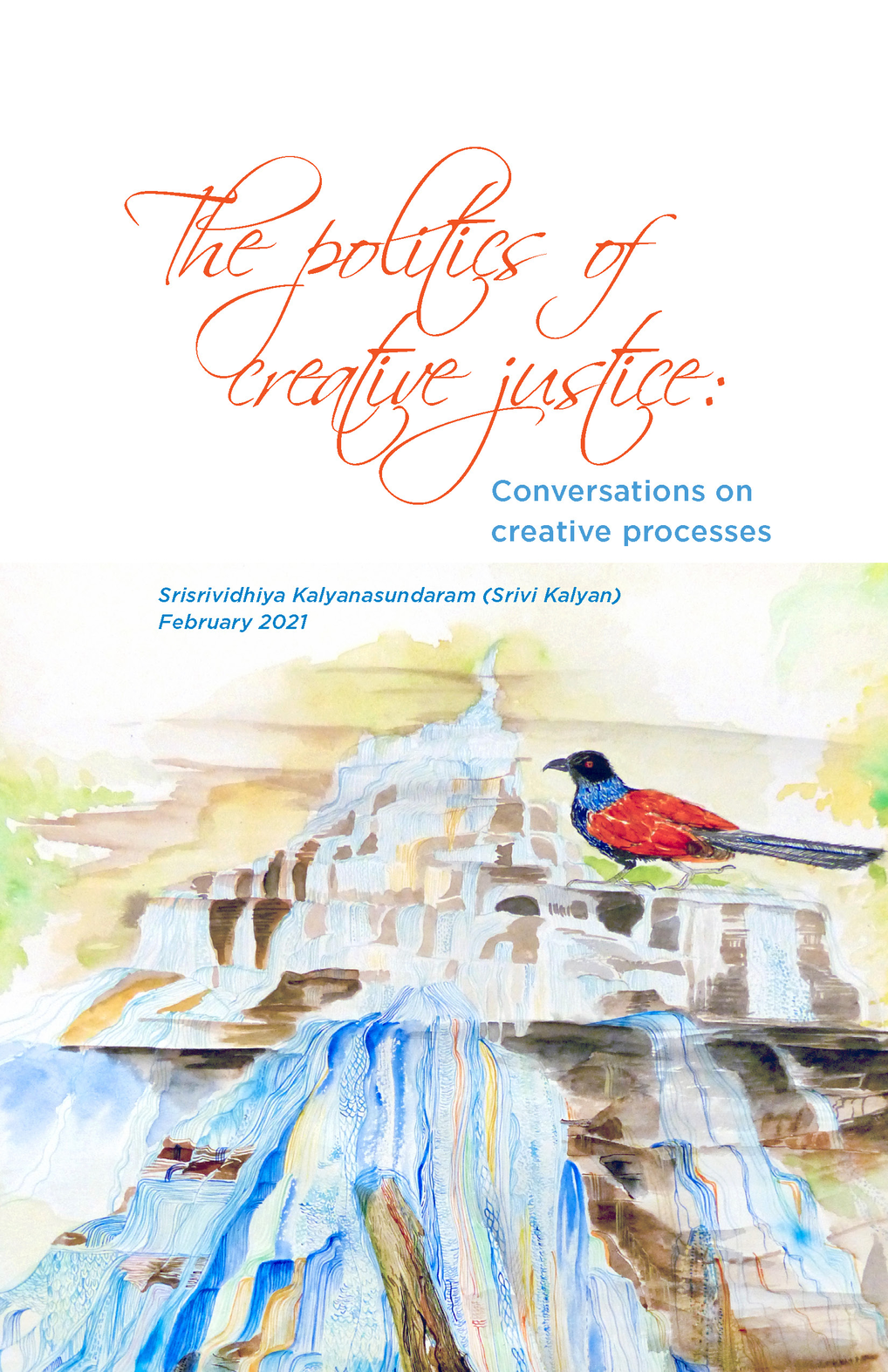Creativity emerges from a state of being free of one’s own ego. It is a seamless process when we are in tune with ourselves and the world we live in and we are able to transcend them to resonate with the essence of all life. It comes from a space of inner stillness of quietude, a fondness for life and living. I share with my students the following quote from a cooking show I am watching that resonates with all that we have spoken so far and these are my final few chat messages to summarize the conversation we began in particular on the 9th of February with the coucal and the dancing frog. A few other messages as memories unfolded and thank you’s were shared till the 27th of February have been included in Part 2 or 3.
[8:39 pm, 23/02/2021] Srivi Kalyan: "Creativity and ego cannot go together. If you free yourself from the comparing and jealous mind, your creativity opens up endlessly. Just as water springs from a mountain, creativity springs from every moment. You must not be your own obstacle. You must not be owned by the environment you are in. You must own the environment, the phenomenal world around you. You must be able to move freely in and out of your mind. This is being free. There is no way you can't open up your creativity. There is no ego to speak of. That is my belief"- Chef's table - Jeong Kwan, Vol 3, Netflix
[8:45 pm, 23/02/2021] Srivi Kalyan: Jeong Kwan is a Buddhist nun in Korea, and is featured in one of the cooking shows for her sublime cooking. This is her narration in the show. This is also what I believe in, as well as my own practice of creativity. In many ways, this is the cultural gift of our ancestors, what should be our natural intuition and way of being. Infact, if you look back at tradition, creativity was a way of life, not something you studied or got a degree in. It is how you lived your everyday life.
[9:08 pm, 23/02/2021] Srivi Kalyan: And this nature of creativity, and egoless, yet confident state of being cannot happen without connecting with the natural world, without allowing landscapes, and other beings to shape you, without being moved and sculpted by the beauty of wind, water and all the elements.
[9:09 pm, 23/02/2021] Srivi Kalyan: And strangely enough, in some ways it is hard work, but in other ways, it is a very simple and natural way of being. It is like a tree or a river, a scarlet minivet flitting around or a garden lizard. It is straightforward, honest simplicity.
[9:26 pm, 23/02/2021] Srivi Kalyan: And I understand the things that feel overwhelming when I share my work or just my conversations, even as you seek me out, that you are sometimes awed or confused or conflicted by what I have to say.
[9:28 pm, 23/02/2021] Srivi Kalyan: I don't have techniques to teach, learning from me is to learn the philosophy of my work and art, the philosophy of a way of life. Yes I teach techniques and tools along the way, but what I hope you can take away with you is the philosophy and then go on to craft your own ways of being and philosophies.
So when you come for your meetings with me, let's ponder together. That way, both of us will go back richer than we came to the conversation.
This pondering together is perhaps the principle of my pedagogy. It is utopian and idealistic, it comes from the felt being and the heart, it comes from traditional ways of perception, creativity, artistic process, aesthetic perception and the ideas of relationships between teacher and student, learning and teaching, mentoring and choosing who and how one will learn from another. And from a very young age, I have believed that there is no hierarchy in this process of teaching and learning. It is akin to breathing. I write this here, because my students have encouraged me and I take confidence in the fact that they have trusted me with their worlds, their vulnerabilities and fears, their joys and the ways in which they are reshaping their world and the world at large. I thank them immensely for this participatory process, both their silent and active listening and their wonderful projects that I look forward to see evolving.
In the case of my older students Ramnath and Sreelekha, with whom I am discussing after eight to ten years after first meeting them, it is a pleasure and sense of friendship, camaraderie of sorts of shared memories and languages that we have co-evolved. Their trust in me, and the many times that they have helped me in being and becoming a mentor, a teacher, a guide and a friend is much appreciated.
Ours is a idealistic world, my students and I, for we wander in landscapes interior and exterior, virtual and real, where subtle selves meet and talk, in spaces of trust and healing, hope and action. We come together to inspire each other and find ourselves in the reflections of the other as our own selves. This kind of pedagogy is sheer poetry, frustrating, fantastic and fun. And in our quietest moments, it leaves us with a sense of gratitude for life and for each other.

